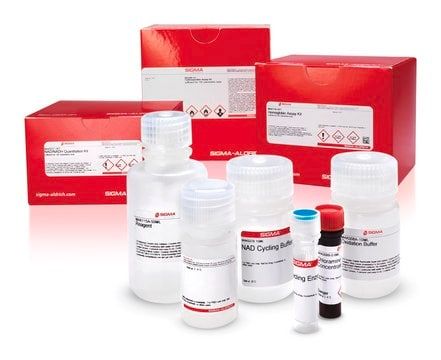MAK327
Aldehyde Dehydrogenase Inhibitor Screening Kit
sufficient for 100 colorimetric tests
Manufacturer: Sigma Aldrich
Synonym(S): ALDH Inhibitor Assay Kit
Select a Size
| Pack Size | SKU | Availability | Price |
|---|---|---|---|
| 1 KIT | MAK327-1-KIT | In Stock | ₹ 32,412.00 |
MAK327 - 1 KIT
In Stock
Quantity
1
Base Price: ₹ 32,412.00
GST (18%): ₹ 5,834.16
Total Price: ₹ 38,246.16
usage
sufficient for 100 colorimetric tests
detection method
colorimetric
relevant disease(s)
cancer
storage temp.
−20°C
Description
- General description: Aldehyde Dehydrogenases (ALDHs) are a superfamily of oxidoreductases which catalyze the conversion of aldehydes to carboxylic acids. ALDH is crucial in the metabolism of alcohol as alcohol dehydrogenase breaks down ethanol to acetaldehyde. Acetaldehyde, which is toxic to the body, is in turn broken down by ALDH to acetic acid. Imbalances of aldehyde dehydrogenase have been linked to both alcoholism and alcohol sensitivity in people. Inhibitors of the enzyme have been used in cases to treat alcoholism in patients. Cancer stem cell populations also display a heightened activity of ALDH, making ALDH inhibition a promising anti-cancer therapy approach.
- Application: The Aldehyde Dehydrogenase Inhibitor Screening Kit may be used for:Alcohol Metabolism ResearchCancer ResearchDrug Discovery
- Features and Benefits: High-Throughput Compatibility: The kit seamlessly integrates into high-throughput handling systems, ensuring efficiency and accuracy.Efficient Inhibitor Screening: Screen for ALDH inhibitors with as little as 5 µL of test compound, facilitated by a streamlined procedure requiring minimal effort.
- Suitability: Suitable for inhibitor screening and evaluation of ALDH inhibitors.
- Principle: The Aldehyde Dehydrogenase Inhibitor Screening Kit is based on the enzymatic conversion of acetaldehyde to acetic acid and NADH by ALDH. The formed NADH in turn reduces a formazan reagent into a colored product the absorbance of which, measured at 565 nm, is proportional to the enzyme activity in the reaction. The percent inhibition of a test compound can be determined by comparing the activity of ALDH treated with a test compound to the activity of untreated ALDH.
- Other Notes: For additional information on our range of Biochemicals, please complete this form.
SAFETY INFORMATION
Pictograms
Signal Word
Danger
Hazard Statements
Precautionary Statements
P210 - P280 - P303 + P361 + P353 - P304 + P340 + P312 - P305 + P351 + P338 - P308 + P313
Hazard Classifications
Acute Tox. 4 Dermal - Acute Tox. 4 Inhalation - Eye Irrit. 2 - Flam. Liq. 3 - Repr. 1B
WGK
WGK 2
